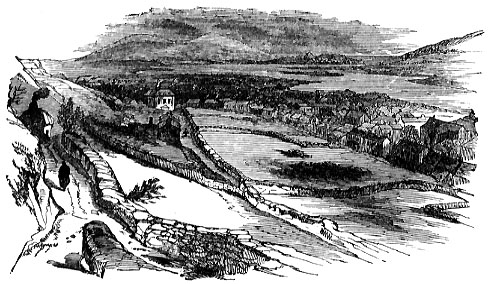FOOD RIOTS IN IRELAND.
CONDUCT OF THE LIBERATOR
CONDUCT OF THE LIBERATOR

We hold it to be a moral axiom, that the misfortunes of a nation, as of
individuals, may be traced to a retributive justice, worked out through its own
crimes or follies. It is idle to look beyond ourselves for the source of
whatever mischief of misery befall us; and if our aim is to regain happiness, we
shall be very wide of the mark if we think to do so by attempting to correct
others, under the flattering but false impression, that it is not us but our
neighbours who have been in fault. Ireland should reflect upon this. Her
grievance-mongers have now for more than a quarter of a century been agitating
upon the pretended injustice of England towards her weaker sister, but without
the least benefit, as we can perceive, accruing to the Irish people therefrom.
They are still what they ever were, a discontented and starving people. And
should they get their last demand, even Repeal, would they be better off?
Not one bit. We are sure it could not be the case, whilst they persist in
proclaiming themselves to be the finest peasantry in the world, and their island
"The first flower of the ocean,
first gem of the sea."
But indeed, at the present moment, it is ungenerous to upbraid; Ireland needs something more than advice. Famine, the most pinching, has added its horrors to the misery previously unbearable. Fathers see those they love slowly expiring for the want of bread. Men, sensitive and proud, are upbraided by their women for seeing them starve without a struggle for their rescue. Around them is plenty; rickyards, in full contempt, stand under their snug thatch, calculating the chances of advancing prices; or, the thrashed grain safely stored awaits only the opportunity of conveyance to be taken far away to feed strangers. Do the children of the soil hesitate to see the avarice of man, thus speculating on the visitations of Heaven and do they not resent the inhumanity as treason to our common nature? But a strong arm interposes to hold the maddened infuriates away. Property laws supersede those of Nature. Grain is of more value than blood. And if they attempt to take of the fatness of the land that belongs to their lords, death by musketry, is a cheap government measure to provide for the wants of a starving and incensed people.

This must not be. To prove the charge of injustice, oppression only is required. But England indignantly denies all that Irish agitators have alleged, and to prove the sincerity of her sympathy she must now advance unhesitatingly that relief which can alone save the Irish people. And she will do. England will give with an open hand. Will Ireland, like a sturdy vagrant, continue to curse a generosity that fails to satisfy inordinate, unreasonable demands? We shall not stay to calculate how much it may be abused; what considerable portion of the relief forwarded may go to swell the exactions of greedy, needy demagogues, whose stock in trade is their country's misfortunes, and who, vampire like, suck the life-blood of their infatuated followers, fanning their victims with the idle wind of winged words to lull suspicion and secure repose. These are, indeed, the curse of that unhappy land. Cruel, unnatural leaders, who cannot meet each other without mutual smiling at the unsuspecting gullibility upon which they prey. With these however, in the present crisis, we have nothing too. Feed the distressed first, and perhaps they will listen afterwards to our exhortations and advice. In the meantime we must assist in the good work of forwarding the measures of relief, that benevolent individuals throughout the kingdom are carrying out. Opportunity to help themselves, the late ministry, by the Labour Rate Act, have placed in the hands of the Irish gentlemen themselves. Able-bodied men at all events will get employment and wages. But this will not be sufficient; the aged and infirm, the women and children, have also to be provided for. Subscription lists should be opened in every town. A testimonial to Heaven for the mercy vouchsafed to ourselves could not have a more opportune moment to command contributions. Is gratitude alone due to man for the relief from corn taxation we have obtained this very year? Had it been otherwise, with the serious failure of our potato crop, what would now have been the price of bread? Give of the surplus gained but a trifling portion, and an ample fund will be provided for our Irish brethren.
But the crisis that is at hand, awful as it is, may, by a wise government, be
made productive of permanent good to the empire, that will more than compensate
the temporary misery it occasions; for a liberal measure of relief, with full
stores of cheap grain to distribute at low prices, would contrast beneficially
for the English character, with the rapacity evinced by the Irish agitators.
![]()
